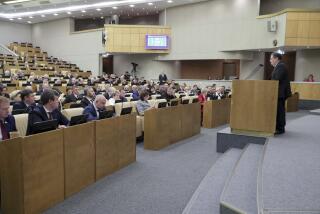Russia’s Small Federal Budget Faces Large Obstacles
- Share via
MOSCOW — Russia’s lower house of parliament passed a federal budget Friday that calls for minuscule spending, by U.S. standards, but nonetheless left international lenders cold.
The budget provides stark testimony on how far the former superpower has fallen in its difficult transition to a market economy. This year’s $1.7-trillion U.S. budget dwarfs Russia’s planned spending--$25 billion. That means massive Russia intends to spend in a year what the United States will spend in about five days.
And yet International Monetary Fund officials, who had been watching the progress of the budget closely, walked away dissatisfied, announcing Friday that they were leaving Russia without agreeing to release suspended loans.
An IMF statement reported Friday by the Itar-Tass news agency said officials will return to Moscow once the government of Prime Minister Yevgeny M. Primakov puts together a program worthy of international support.
A chorus of Western analysts almost universally condemned the budget as unrealistic in its assumptions on inflation, the ruble exchange rate and revenue.
“At this stage, it’s clear that an IMF agreement is not around the corner,” said London-based economic analyst Charles Blitzer of investment firm Donaldson, Lufkin & Jenrette. “As with previous Russian budgets, this one is not in any sense going to be fulfilled.”
Russia’s federal budget has become the main bone of contention between Moscow and international lenders, who say the Russian government must do more to raise tax revenue and curtail social spending.
In Russia, however, the budget is seen as the toughest that has ever passed through Russia’s Communist-dominated lower house, known as the Duma.
Otto R. Latsis, editor of the Noviye Izvestia newspaper, called it “the most antisocial and tightest budget among all other previous budgets.”
“If in the past the government was known to be fond of dipping into people’s pockets from time to time, now the government is simply turning its citizens’ pockets inside out,” he said, noting that the artificially low inflation estimate means that rubles used to pay delayed pensions and salaries will be almost worthless by the time they reach people.
The budget is built on several highly dubious assumptions, analysts say:
* That billions of dollars in revenue will come from foreign lenders--including a $4.3-billion loan installment from the IMF, frozen last year.
* That inflation will remain at 30% and the ruble exchange rate will remain steady at 21.5 rubles to the dollar--already higher than this week’s average of about 23 rubles to the dollar.
* That Russia’s tax collectors and other revenue-raisers will meet a $20.5-billion target, despite government plans to cut the value-added tax.
Moscow-based analyst Charlie Ryan of United Financial Group said the only way Russia will get IMF help is if it immediately rewrites its budget in an effort to prove it is serious about collecting taxes.
“No one believes they have the political will to collect taxes,” he said.
However, Blitzer argued that the West’s reluctance to alienate Russia could play a part in an eventual IMF agreement.
“There are concerns that totally pushing [Russia] outside the tent might be counterproductive from a broader strategic viewpoint,” he said. “These are not things that the IMF is supposed to take into account. But sometimes these things do matter.”
More to Read
Sign up for Essential California
The most important California stories and recommendations in your inbox every morning.
You may occasionally receive promotional content from the Los Angeles Times.










